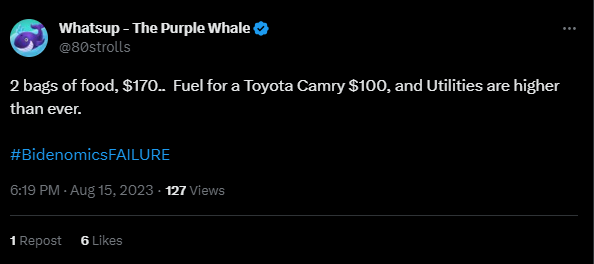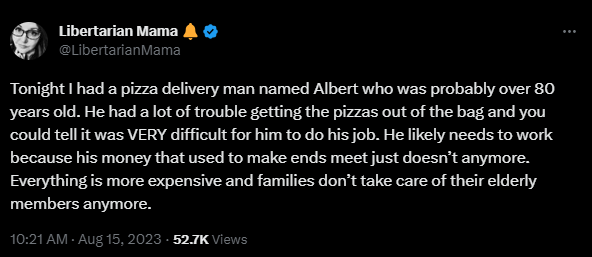Bidenomics are Everywhere: The Rich are Getting Richer and The Poor are Getting Poorer

I'm not an economist, and my financial education is far from robust, so when I witness the steep ascent of prices across various commodities, inflation is the first culprit that crosses my mind. But is inflation truly the sole antagonist responsible for the worldwide erosion of purchasing power? Maybe... Technically, when a flood of money is conjured out of thin air with reckless abandon, some degree of inflation or currency devaluation is an anticipated consequence.
Right off the bat, I must credit @whatsup for kindling the inspiration behind this post through her tweets and retweets yesterday. Among these, one particular tweet caught my attention, captured in the screenshot above, where Whatsup divulges the cost of 2 bags of groceries and the fuel expense for a Toyota Camry.
Now, my dear Whatsup, I might not be privy to the exact contents of the groceries you acquired for nearly $100 per bag, but I can certainly attest that refueling my car demands a hefty $115 for a full tank of diesel. My vehicle, a 2004 Audi A4 fitted with a 1.9 TDI (diesel) engine, boasts a 70-liter tank. To brim its tank, I find myself shelling out around $115 for diesel.
Though I'm uncertain about the exact dimensions of a Camry's fuel tank, what I am certain of is that Romania's average income is worlds apart from that of the United States. Positioned significantly below the median income in my country, I reckon myself fortunate to have to pay "only $100" for fueling a Camry.

The subsequent tweet that seized my attention from Whatsup happened to be a retweet, one that struck a chord with its heartrending content. The image of an 80-year-old individual delivering pizza is a painful reality that, although hard to fathom, I accept as the undeniable truth. Irrespective of the indices and figures economists wield to elucidate the shambles that our economy is purportedly grappling with, what remains undeniable is the alarming chasm between the prosperous and the impoverished.
Prices have surged across the board, with no exceptions. Though there was a temporary respite, particularly in fuel prices, the status quo seems to have reverted. It's possible that the driving season in Europe might have played a role, yet diesel prices have soared over 10% in just the past couple of weeks. Curiously, commodities appear to be surpassing even Bitcoin's volatility in recent times.
A concerted effort is underway by the elites to attribute this turmoil to Russia and the embargos on oil. However, this narrative is nothing but a fabrication. Russian oil continues its global journey at the same unaltered pace as before the war. So why, I ask, are the faltering economies of nearly all nations being attributed to this matter?
Instead, let's point the finger at the OPEC+ cuts... Ah, now that might just explain the resurgence in fuel prices. Just like with currencies, when liquidity is siphoned out of the market, prices inevitably surge. You might have encountered discussions on Twitter regarding the significant drainage of oil liquidity from the market. But why undertake such a maneuver?
The answer is astoundingly simple: the realization that demand remains unwavering, irrespective of price. Hence, why peddle their product at a discount when they can amass greater profits with reduced production? In today's scheme of things, the individual is inconsequential, reduced to a mere numerical entity on a screen. If you've been attuned to the ongoing wealth transfer, it's starkly evident that affluence is consolidating among the rich while the underprivileged continue their slide into destitution.
Reports have surfaced today of The Netherlands shadowing Germany into an impending recession. Best of luck in striving to attain climate change objectives, dear boys and girls! So, does Bitcoin (or Hive) stand as a shield against personal economic adversity? We'll delve into that inquiry in the forthcoming episode...
Thanks for your attention,
Adrian
There's a concept I came across the other day. Where the cost of a product or service doesn't increase (e.g. in the case of a monopoly software provider, or a fuel company which can adjust production), and the supplier puts up the price "just because they can", any increase in price to the end user isn't inflation. It's greedflation.
Sounds true. It's harder and harder to understand economics these days. I agree with you, most of the giant companies out there are just spiking up the prices because they can.
The whole Bidenomics thing is a red herring and an inside joke I'm sure. When I hear the garbage from those talking heads about how well the economy is going it reminds me of this cartoon from Bob Moran :-
This one is famous in my country too. It holds much truth to it.
I now work in a building for Seniors living on SS and it hurts my heart
I get you...